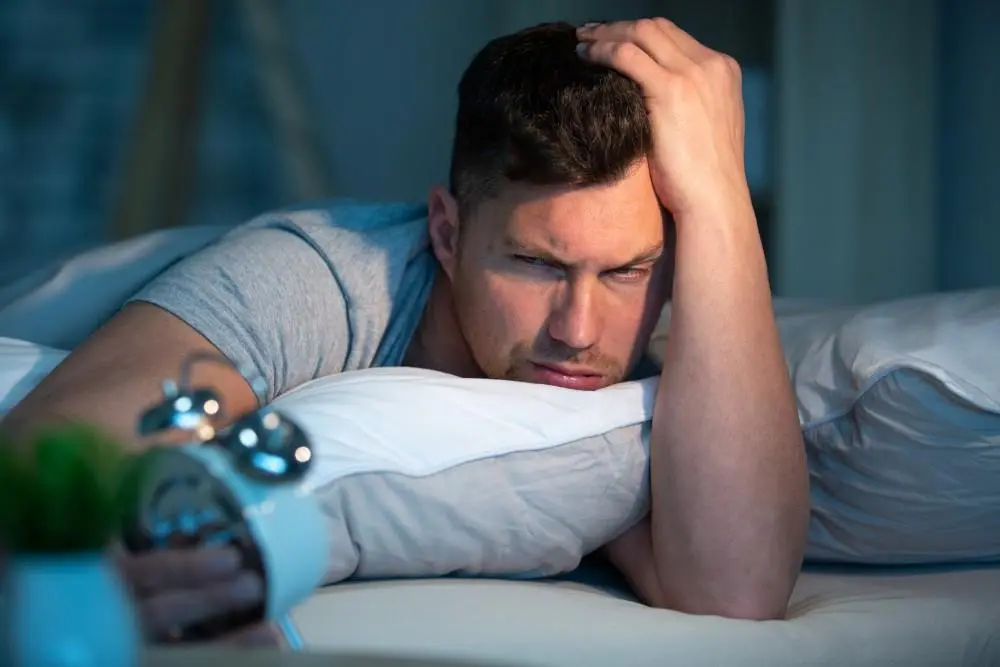Anabolic steroids, synthetic derivatives of testosterone, are often utilized by athletes and bodybuilders to boost muscle mass and enhance performance. However, the non-medical use of these substances can lead to significant side effects, impacting various aspects of an individual’s health. Among these, disturbances in sleep patterns, including the onset of insomnia, are less frequently discussed yet equally concerning outcomes of anabolic steroid abuse.
The relationship between anabolic steroids and sleep disturbance is complex, involving both direct and indirect physiological effects. Steroids can disrupt the natural balance of hormones in the body, which plays a critical role in regulating sleep-wake cycles. Moreover, steroid use correlates with increased anxiety and stress levels, which can further exacerbate sleep issues, leading to a cycle of poor sleep and increased reliance on substances.
Quick Summary
- Anabolic steroid use is linked to sleep disturbances and the development of insomnia.
- Hormonal imbalances caused by steroids can alter natural sleep-wake cycles.
- Addressing these sleep issues involves understanding the underlying biological interactions and implementing treatment strategies.
Understanding Anabolic Steroids

Anabolic steroids, often termed anabolic-androgenic steroids (AAS), are derivatives of testosterone that promote muscle growth and develop secondary male sex characteristics.
Classification and Function
Anabolic-androgenic steroids (AAS) can be classified into exogenous, synthetic derivatives and endogenous, naturally occurring forms. They function by binding to androgen receptors in cells, which leads to increased protein synthesis and muscle growth. In terms of medical use, AAS are prescribed for conditions like muscle wasting diseases and hormone imbalances. They also play a role in treating delayed puberty in males and breast cancer in females.
Prevalence of Use in Athletics and Resistance Training
In the context of athletics, AAS use is prevalent in sports that prioritize muscle size and strength. Resistance exercises such as weightlifting often see AAS use to enhance muscle gain. However, their use in professional sports is generally prohibited due to fairness and health concerns. Despite this, athletes at all levels, including professional, collegiate, and high school, have been documented using these substances to gain a competitive edge.
Potential for Abuse and Dependence
There is a significant potential for abuse and dependence on AAS. Long-term use can lead to a psychological dependence where individuals continue to use steroids despite physical problems and negative effects on social relations. Steroid abuse is associated with a range of adverse effects, including mood swings, manic behavior, and sleep disturbances. The abuse of these substances also poses significant health risks, such as liver damage, cardiovascular problems, and hormonal imbalances.
References
- National Institute on Drug Abuse (NIDA): https://www.drugabuse.gov/publications/drugfacts/anabolic-steroids
Anabolic Steroids and Sleep Patterns

Anabolic steroids have been observed to influence sleep patterns, particularly affecting sleep architecture and efficiency. They may disrupt the balance between REM and Non-REM sleep components, being detrimental to sleep quality.
Effects on Sleep Architecture and Efficiency
Research indicates that anabolic steroids can alter normal sleep architecture. They have been associated with reduced sleep efficiency, which is a measure of the quality of sleep. Anabolic steroids may lead to increased sleep disturbances and frequent awakenings, thus fragmenting sleep patterns and reducing the restorative effects of sleep. This can be particularly evident in individuals using high doses or those on prolonged steroid cycles.
- Sleep Architecture: Involves cycles of REM and Non-REM sleep stages.
- Sleep Efficiency: The ratio of time spent asleep to the total time spent in bed, represented as a percentage.
Impact on REM and Non-REM Sleep
The use of anabolic steroids has been shown to affect the distribution of REM (Rapid Eye Movement) and Non-REM sleep stages. These drugs can suppress the REM stage, which is essential for cognitive functions and emotional health. Non-REM sleep, especially the slow-wave sleep phase, can also be compromised. Slow-wave sleep is crucial for physical recovery and the growth and repair of tissues.
- REM Sleep: A mentally restorative sleep stage characterized by rapid eye movements and vivid dreaming.
- Non-REM Sleep: Encompasses several stages, from light sleep (N1 and N2) to deep sleep (slow-wave sleep, or N3).
Biological Interactions and Hormonal Imbalances

Anabolic steroids can significantly affect sleep patterns by disrupting hormonal balances, particularly those of testosterone, cortisol, and growth hormones.
Testosterone and its Influence on Sleep
Testosterone, a hormone primarily produced in the testes, plays a crucial role in sleep regulation. Elevated testosterone levels can lead to a reduction in sleep efficiency and duration. Research indicates that individuals using anabolic steroids exhibit higher levels of testosterone, which correlates with shorter sleep duration and delayed onset of sleep.
- Impact on REM Sleep: High testosterone levels have been associated with a decrease in rapid eye movement (REM) sleep, the sleep stage linked with dreaming and memory consolidation.
- Sleep Architecture: Testosterone can also alter the normal architecture of sleep, leading to fewer sleep cycles and disturbances in sleep patterns.
Cortisol and Sleep Disturbances
Cortisol, often referred to as the “stress hormone,” should naturally decline at night, allowing the body to relax and enter sleep. Anabolic steroids can disrupt this balance, resulting in elevated nighttime cortisol levels.
- Stress Response: Increased cortisol can heighten the body’s stress response, making it difficult to fall and stay asleep.
- Interaction with Testosterone: Elevated cortisol may also interfere with testosterone production, further complicating sleep disturbances.
Interplay of Growth Hormones and Sleep Quality
Growth hormone is released during sleep and is essential for tissue repair and muscle growth. Anabolic steroids can impact the natural secretion patterns of growth hormones, affecting sleep quality.
- Secretion Disruption: Anabolic steroids can disrupt the nocturnal secretion of growth hormone, leading to less restorative sleep and potentially impacting muscle recovery and growth.
- Effect on Sleep Phases: Changes in growth hormone levels can alter the sleep cycle, especially the deep sleep phase where most growth hormone is released.
References
Physical and Mental Health Concerns

The use of anabolic steroids has been linked to a range of physical and mental health concerns, with particular emphasis on disruptions to sleep patterns and the risk of developing mood disorders.
The Link Between Steroid Use and Sleep Disorders
Anabolic steroids can disrupt an individual’s sleep cycle, leading to a condition known as insomnia. Studies have found that the use of these substances can shorten the duration of deep REM sleep, which is critical for cognitive function and physical health.
Mood Disorders and Cognitive Effects
Users of anabolic steroids may experience significant mood swings and heightened aggression, often referred to as ‘roid rage’. Long-term usage has been associated with an increased risk of depression and other mood disorders. Cognitive impairments, including difficulty concentrating and memory lapses, may also occur.
Impact on Aging and Neurodegenerative Diseases
Emerging research suggests that the abuse of anabolic steroids may accelerate the brain’s aging process, potentially leading to earlier onset of neurodegenerative diseases such as dementia. These substances might alter the levels of neuroactive steroids, which are crucial for maintaining brain health and function.
Management and Treatment Strategies

In managing the impact of anabolic steroids on sleep and insomnia, it is crucial to address sleep disruptions and possibly mitigate the complications of sleep apnea syndrome. Treatment strategies often include modifying steroid use, considering testosterone replacement therapy, and employing devices like continuous positive airway pressure machines.
Approaches to Curb Sleep Disruption
Sleep disruptions caused by anabolic steroids require a multifaceted management approach. A gradual reduction in steroid use can alleviate sleep-related side effects. Cognitive-behavioral therapy (CBT) is also effective in treating insomnia by challenging unhelpful beliefs about sleep and teaching relaxation techniques. Some patients may benefit from pharmacologic interventions, such as the short-term use of sedative-hypnotics, under strict medical supervision.
Testosterone Replacement and Sleep
Testosterone replacement therapy (TRT) can be a double-edged sword when it comes to sleep. On one hand, TRT might improve sleep quality in those with low testosterone levels. On the other hand, it could exacerbate sleep apnea syndrome in susceptible individuals. Careful monitoring and adjustments of hormone levels are crucial for patients undergoing TRT. It is important for healthcare providers to assess sleep quality regularly and adjust treatment protocols accordingly.
Use of Continuous Positive Airway Pressure
Continuous positive airway pressure (CPAP) is a key treatment for obstructive sleep apnea, which may be worsened by anabolic steroid use. CPAP machines deliver air through a mask to keep the airways open during sleep, improving sleep quality and reducing daytime fatigue. Compliance with CPAP treatment is essential for its effectiveness, and patients may require assistance with mask fitting and education about the importance of the treatment.
References
- The Use of Cognitive Behavioral Therapy for Insomnia: https://www.ncbi.nlm.nih.gov/pmc/articles/PMC3630964/
- Effects of Testosterone Therapy on Sleep and Breathing in Obstructive Sleep Apnea: https://www.ncbi.nlm.nih.gov/pmc/articles/PMC5649360/
- Continuous Positive Airway Pressure for Obstructive Sleep Apnea: https://www.atsjournals.org/doi/full/10.1164/rccm.201701-0044CI
Frequently Asked Questions

Anabolic steroids can influence sleep patterns and the incidence of insomnia significantly. This section answers common concerns regarding the complex relationship between steroid use and sleep.
What are the effects of anabolic steroids on sleep patterns?
Anabolic steroids may alter sleep patterns by reducing the time spent in deep sleep phases and increasing nighttime awakenings. Users often report a change in their sleep architecture after starting steroids.
Is there a correlation between steroid use and the incidence of insomnia?
Research suggests a strong correlation between the use of anabolic steroids and increased rates of insomnia. The disruption in endocrine function and stress response systems is believed to contribute to sleep disturbances.
How do steroid injections influence the duration and quality of sleep?
Steroid injections have been associated with decreased sleep duration and fragmented sleep quality. They can cause hormonal imbalances that interfere with the body’s natural sleep-wake cycle, leading to difficulties in initiating and maintaining sleep.
Are there effective strategies to manage insomnia caused by prednisone?
Managing insomnia from prednisone involves consistent sleep hygiene practices, such as maintaining a regular sleep schedule, creating a comfortable sleep environment, and avoiding stimulants before bedtime. In some cases, a gradual reduction in prednisone dose under medical supervision may help alleviate insomnia.
Do anabolic steroids disrupt REM sleep or other sleep stages?
Anabolic steroids can disrupt Rapid Eye Movement (REM) sleep, the stage associated with dreaming and memory formation. Disturbances in REM sleep can lead to fatigue and cognitive impairments.
What precautions should be taken when combining sleeping pills with anabolic steroid therapy?
When combining sleeping pills with anabolic steroids, it is important to do so under medical supervision. There can be increased risk of side effects and interactions, so a healthcare provider should carefully manage and monitor the combination of treatments.
References
Effects of synthetic androgens on liver function and on body and liver growth of castrated rats
The Impact of Anabolic Androgenic Steroids on the Central Nervous System
Dr. Grant Fourie, a specialist in male hormones, is based in Cape Town, South Africa. He provides comprehensive treatments for conditions related to low testosterone, such as erectile dysfunction, fatigue, and mood changes. His methods include hormone replacement therapy and other modern treatment options.
Contact me via email or phone to book personal appointment in my clinic: The Village Square, Cape Town - South Africa



